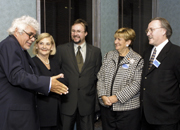
Seen at
the conference are, left to right, longtime Bourassa aide Mario Bertrand,
Mme Andrée Bourassa, Concordia professor Guy Lachapelle, Senator
Lise Bacon and UQAM professor Robert Comeau.
Photo by Andrew Dobrowolskyj
|
by Eleanor Brown and Barbara
Black
Imposing the War Measures Act in 1970 wasn’t Pierre Trudeau’s
idea, though he defended it fiercely with his “Just watch me”
attitude. In fact, it was urged on the prime minister by then premier
Robert Bourassa, who had been told by the Montreal police that it was
the only instrument at hand to quell the October Crisis.
That was one of the surprises that came out of the three-day conference
on Bourassa, sponsored jointly by Concordia University and UQAM, and called
Robert Bourassa: Un bâtisseur tranquille.
As leader of the Quebec Liberal party, Bourassa won four mandates from
the people of Quebec. He was premier from 1970 to 1976, and from 1985
to 1994. He died in 1996.
Concordia Political Science Professor Guy Lachapelle was delighted by
the conference, both in terms of the political insights it provided to
scholars and the media interest it generated — 20 articles between
March 22 and 25, not only in both languages in Montreal, but in papers
in Ottawa and Quebec City.
The image of Bourassa as an indecisive leader must be revised, he said.
“In fact, he was quick in making decisions, but careful about consulting
his colleagues,” Lachapelle said. “He loved to have [quantities
of] information for this purpose, because it served his role as a strategist.”
Bourassa was deeply commited to Quebec and to being a francophone, Lachapelle
added. “He had no emotional feeling for [English-speaking] Canada.”
He would probably never have gone over to the sovereignist movement that
emerged in the 1970s, however, because he didn’t see it as being
good for Quebec.
His arch-enemy on the hustings may have been René Lévesque,
but the two men had been close colleagues in the Quebec Liberal party
when Lévesque broke away to form the Parti Québécois.
“The project of sovereignty-association was almost written in Bourassa’s
basement,” Lachapelle said, “and the two men always maintained
a great deal of respect for one another.”
At the opening-night panel, journalist Michel David gave an example of
Bourassa’s ability to play with the facts.
“He said to me that he was just yesterday reading a letter my father
had written him. I found the coincidence troubling,” David said.
The ‘letter’ turned out to be a homework assignment from the
1940s from David’s father, who had taught Bourassa in school. For
the politician, it was all part of the game.
All the members of the opening panel, titled The Robert Bourassa I Knew,
were contemporaries or confidantes of the politician, including former
cabinet ministers Raymond Garneau, Paul Gérin-Lajoie and Lise Bacon,
and former aides Mario Bertrand and Ronald Poupart. The panel, held in
the Hall Building auditorium, was moderated by the former editor of
L’Actualité, Jean Paré.
David continued, “You had to decode him. After press conferences,
perplexed reporters would gather and try to figure out what he had said.
There were often three, four or five possible interpretations.” Once,
when caught in an inconsistency over a constitutional question, Bourassa
simply refused to respond.
Not everyone found Bourassa’s tactics admirable. The premier, whom
many thought a cold fish who could waffle through anything, collected
nasty nicknames. Then prime minister Pierre Trudeau, a federal Liberal,
called him a mangeur d’hot dog — an intellectual lightweight
with no class.
Panelists said that Bourassa and Trudeau routinely ignored each other.
Bourassa specialized in threatening Ottawa with Quebec sovereignty in
order to win more power for his province, but it was a carefully scripted
act, said long-time aide Mario Bertrand.
“He always looked like he was wavering, but he always fell over onto
the same side,” that of federalism.
Bourassa was an obsessive communicator and a keen reader of personalities.
Bertrand fondly recalled the 1 a.m. telephone calls. “’Where
are you?’ he would ask. Many times, it would be moments after we’d
just left each other.”
The panelists also portrayed him admiringly as determined, completely
dedicated to politics and Quebec, and a man of consensus. “He preferred
to discuss until you were convinced or until you were worn out, rather
than saying no to you,” said Garneau.
Modern Quebec leader
Lachapelle said the conference also confirmed Bourassa as a social democrat
who pioneered legislation to shore up the French language, gave Quebec
a written charter of rights, introduced universal medicare, strengthened
labour rights and improved access to the judicial system.
In a sense, he launched Quebec into modernity, with major public works
such as the James Bay hydro-electricity project. His terms were also marked
by massive labour unrest, confrontations with aboriginal groups, and the
October Crisis of 1970, in which his friend, labour minister Pierre Laporte,
was murdered.
About 200 people attended the opening event in the Hall Building auditorium,
including Andrée Bourassa, the former premier’s widow, and
two of their grown children. The weekend conference was the 14th Colloque
sur les leaders du Québec contemporain, sponsored since its inception
by the Université du Québec à Montréal, and
this year, undertaken with Concordia.
|
| |



